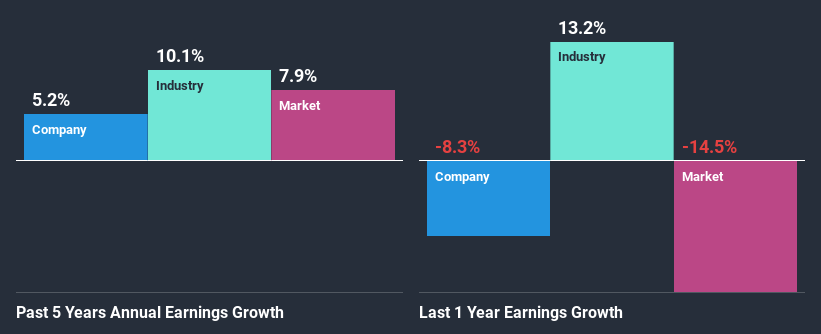Vetoquinol SA's (EPA:VETO) Stock Has Seen Strong Momentum: Does That Call For Deeper Study Of Its Financial Prospects?

Vetoquinol's (EPA:VETO) stock is up by a considerable 7.1% over the past month. We wonder if and what role the company's financials play in that price change as a company's long-term fundamentals usually dictate market outcomes. Specifically, we decided to study Vetoquinol's ROE in this article.
Return on Equity or ROE is a test of how effectively a company is growing its value and managing investors’ money. In simpler terms, it measures the profitability of a company in relation to shareholder's equity.
View our latest analysis for Vetoquinol
How To Calculate Return On Equity?
ROE can be calculated by using the formula:
Return on Equity = Net Profit (from continuing operations) ÷ Shareholders' Equity
So, based on the above formula, the ROE for Vetoquinol is:
8.1% = €30m ÷ €376m (Based on the trailing twelve months to June 2020).
The 'return' is the income the business earned over the last year. So, this means that for every €1 of its shareholder's investments, the company generates a profit of €0.08.
Why Is ROE Important For Earnings Growth?
Thus far, we have learned that ROE measures how efficiently a company is generating its profits. Depending on how much of these profits the company reinvests or "retains", and how effectively it does so, we are then able to assess a company’s earnings growth potential. Generally speaking, other things being equal, firms with a high return on equity and profit retention, have a higher growth rate than firms that don’t share these attributes.
A Side By Side comparison of Vetoquinol's Earnings Growth And 8.1% ROE
On the face of it, Vetoquinol's ROE is not much to talk about. However, given that the company's ROE is similar to the average industry ROE of 9.8%, we may spare it some thought. On the other hand, Vetoquinol reported a moderate 5.2% net income growth over the past five years. Taking into consideration that the ROE is not particularly high, we reckon that there could also be other factors at play which could be influencing the company's growth. Such as - high earnings retention or an efficient management in place.
We then compared Vetoquinol's net income growth with the industry and found that the company's growth figure is lower than the average industry growth rate of 11% in the same period, which is a bit concerning.

Earnings growth is an important metric to consider when valuing a stock. What investors need to determine next is if the expected earnings growth, or the lack of it, is already built into the share price. Doing so will help them establish if the stock's future looks promising or ominous. One good indicator of expected earnings growth is the P/E ratio which determines the price the market is willing to pay for a stock based on its earnings prospects. So, you may want to check if Vetoquinol is trading on a high P/E or a low P/E, relative to its industry.
Is Vetoquinol Making Efficient Use Of Its Profits?
Vetoquinol's three-year median payout ratio to shareholders is 16% (implying that it retains 84% of its income), which is on the lower side, so it seems like the management is reinvesting profits heavily to grow its business.
Additionally, Vetoquinol has paid dividends over a period of at least ten years which means that the company is pretty serious about sharing its profits with shareholders. Upon studying the latest analysts' consensus data, we found that the company is expected to keep paying out approximately 15% of its profits over the next three years. Regardless, the future ROE for Vetoquinol is predicted to rise to 10.0% despite there being not much change expected in its payout ratio.
Summary
Overall, we feel that Vetoquinol certainly does have some positive factors to consider. Namely, its respectable earnings growth, which it achieved due to it retaining most of its profits. However, given the low ROE, investors may not be benefitting from all that reinvestment after all. That being so, the latest analyst forecasts show that the company will continue to see an expansion in its earnings. To know more about the latest analysts predictions for the company, check out this visualization of analyst forecasts for the company.
If you decide to trade Vetoquinol, use the lowest-cost* platform that is rated #1 Overall by Barron’s, Interactive Brokers. Trade stocks, options, futures, forex, bonds and funds on 135 markets, all from a single integrated account. Promoted
New: Manage All Your Stock Portfolios in One Place
We've created the ultimate portfolio companion for stock investors, and it's free.
• Connect an unlimited number of Portfolios and see your total in one currency
• Be alerted to new Warning Signs or Risks via email or mobile
• Track the Fair Value of your stocks
This article by Simply Wall St is general in nature. It does not constitute a recommendation to buy or sell any stock, and does not take account of your objectives, or your financial situation. We aim to bring you long-term focused analysis driven by fundamental data. Note that our analysis may not factor in the latest price-sensitive company announcements or qualitative material. Simply Wall St has no position in any stocks mentioned.
*Interactive Brokers Rated Lowest Cost Broker by StockBrokers.com Annual Online Review 2020
Have feedback on this article? Concerned about the content? Get in touch with us directly. Alternatively, email editorial-team (at) simplywallst.com.
About ENXTPA:VETO
Vetoquinol
A veterinary pharmaceutical company, designs, develops, and sells veterinary drugs and non-medicinal products in Europe, the Americas, and the Asia Pacific region.
Undervalued with excellent balance sheet.
Similar Companies
Market Insights
Community Narratives



